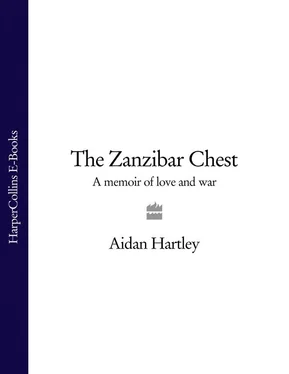‘I cried,’ my mother always told me. ‘And Dad cried too, the first time I had seen him cry since his mother died.’
‘The sequel to all this is so unpleasant to write about that I will try and put it on record and sort it out later,’ my father wrote as an old man. ‘It is something disastrous for that beautiful place and the land up on Meru and the house, and our improvements, and everything else. It needs a lot of careful thought.’ He never did write about it anymore, but he pondered what had happened long and hard. Nyerere’s policies collapsed and his books are read no longer. On the farm, what had been a small family business became a Scandinavian-funded aid project, staffed by expatriate experts on salaries paid in Oslo who drove around in gleaming white vehicles. And in time the aid project failed, as schemes of this kind in Africa tend to almost without exception.
Growing up, the loss of my family’s paradise was a festering wound, even though I had no personal memory of the thing that hurt me. I grew up feeling that I had been born too late to be part of our greatest adventure. And things were no longer as they had been in the family, down to the smallest detail. Dad never took me riding or deep-sea fishing. Instead I looked at snapshots of my elder brothers proudly holding up their catch. ‘That white vase,’ Mum said of an empty receptacle: ‘I used to fill it with sprays of purple agapanthus every day.’
The last I heard, an old caretaker and a gang of bats lived in the house on Firesticks Hill, the place of my first memory, and the roof leaked. The stock is lost, eaten, stolen or sold. Poachers have wiped out the wildlife. The elephants, the ostriches and the bullfrogs – the ‘elphanes’, ‘arse-stretches’ and ‘oggy goggies’, as we call them to this day in our intimate family vocabulary of childhood words – are gone. The trees have been hacked down for charcoal to supply the towns. The borehole machinery broke and stopped pumping eleven hundred gallons of clean water a day and the land returned to being a dry desert. My father’s beautiful horses, the ones he had imported from Arabia, with their centuries-old Bedu bloodlines, bolted their stables and ran feral across the plains between the mountains. For years afterwards, people encountered them, cantering like mustangs. Lions took some, while local peasants captured some of the others, either to eat them or put to them to work pulling carts like donkeys. Up on the slopes of Meru, squatters hamstrung the dairy cows, uprooted the pyrethrum, chopped down the big trees and replaced it all with fields of marijuana. They occupied the house and made fires on the parquet floors. They tore the tiles off the roof and ripped out the doors and windows, which they carried off to adorn mud huts. They didn’t manage to tear down the walls and pillars, and from down below on the plains I myself have seen the ruins gleam brightly like a beacon against the slopes of the mountain.
My father was not the type of man to give up and turn his back on Africa. Nor did he stay in order to retreat into bitterness, as had so many Europeans who found their hopes and dreams dashed but found it was too late for them to start again elsewhere. Instead, he embarked on a dramatic new direction. Having been a colonial officer, then a rancher, he now became a development aid worker himself, ultimately in the same game as the Scandinavian experts who had occupied the ranch on Kilimanjaro. The difference with my father was that he truly was an expert after more than forty years of working in Africa, his adopted home. And so he threw himself into working in the most remote areas of the continent he could find, assisting nomads with the husbandry of livestock and peasants with the growing of crops.
In my first coherent memories that run in sequence, in full-colour as it seems, I am often in the back of a four-wheel-drive among clanking kettles, piles of rations and dust, bumping across some drought-blasted plain. I am in camp where wild-haired men squat by the fire and chat with my father about rain and camels. I make my bed out in the open under the stars, or am woken in a village hut by bleating goats or mission hymns, or in a shabby border-town hotel with bare electric bulbs and blue gloss walls.
‘We’re like a tribe of mechanized nomads,’ says my mother. To hear this makes me happy. We are like gypsies, living out an adventure in Africa.
The problem was that we couldn’t always be on the road with Dad. The ways were dangerous. In Eritrea, Dad lost fifteen of his team to landmine explosions on the roads and it was typical of him that he used this as an excuse to dispense with vehicles in favour of trekking cross-country with pack mules. If only I had been old enough to join him. What walks we might have had together.
Instead, our new way of life was filled with goodbyes and absences and flights with my mother to see him wherever he was. These were long journeys with endless waits in airports. Our fellow passengers were often the new Soviet or Chinese officials who had appeared with Africa’s liberation from its European masters. I remember asking a group of men – my mother tells me they were Soviets – to read a story from my Disney comic book. They peered at the pages, looked worried and shook their heads.
We’d arrive in hot and sticky capitals and have to wait for Dad while he was traced out in his wilderness with his livestock and nomads. In Mogadishu, Somalia, we were invariably confined to whichever hotel compound we were checked into due to the upheavals outside. We stayed at the Croce del Sud, known as the Sweaty Crotch. Nearby was the Shebelle, a.ka. the Scratchy Belly. The city erupted in anti-Western riots when Apollo 11 landed Neil Armstrong and Buzz Aldrin on the moon and the mosque preachers declared that it was either American lies or blasphemy.
Soon after the moon landings, the Somali president was assassinated and the army took over. Each afternoon I’d watch from the Sweaty Crotch as soldiers goose-stepped down the street. Many years later I worked out that this was when the dictator president Mohamed Siad Barre had seized power in a coup d’état. During one parade, while my mother and sister were out shopping at the bazaar, I filled a soda bottle from the tap, went back to the room’s balcony and emptied the contents onto the heads of the spectators below. The consequences were dire, for within a few minutes there were loud voices and a hammering at the door. I hid in the bathtub until Mother returned, when she had to promise a group of irate men that I had not pissed on them.
Finally we’d be summoned to desert reunions with my father. These trips survive in my mind only as a jumble of images like one of our heat- and dust-damaged family films. We flew for hours and so slowly that we could see the shadow of the Dakota propeller aircraft on the scrub below. On landing at a Somali airfield I broke loose from my mother and burrowed between the sandal-shod brown legs of men in turbans and women in flowing robes. I knew I would recognize him because he would be the only white man in the crowd. But how was I to behave when I met my father? How warmly would Dad kiss Mum and did they still love each other? And what was this strange life my father lived, among such fierce people?
On Sundays in Somalia, the cooks used to hack the chickens’ heads off with loud bismillahs, then allowed the headless bodies to dance about behind the kitchen. I have a sequence of other disjointed memories: of mosquito larvae in our table water, flexing like red commas magnified in the distorted bowl of the jug; playing Ping-Pong with pasty-faced Chinese commissars in the local hotel; the bleeding toes I got from barefoot soccer with the tough Somali boys; my brother Kim and I on Lido Beach, where camels were slaughtered so that guts lay in bluish puddles on the coral sand; the northern Somali highlands, on a mountain called Ga’an Libah, the Lion’s Fist, where Kim and I tried and failed to rescue a goat from our lunch table; a cave of prehistoric paintings of red handprints and herds of eland stalked by cats and men with alien heads. Once I stood on the banks of a dry riverbed, feeling wind on my face, hearing a rumble, then seeing a wall of brown water explode from around the corner as the flash flood approached.
Читать дальше












